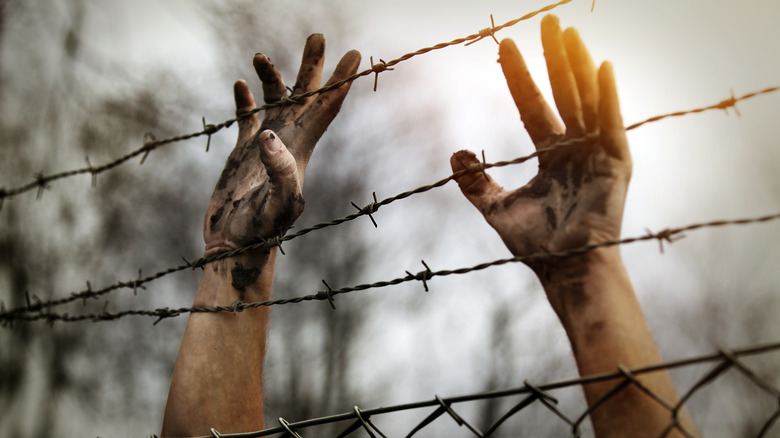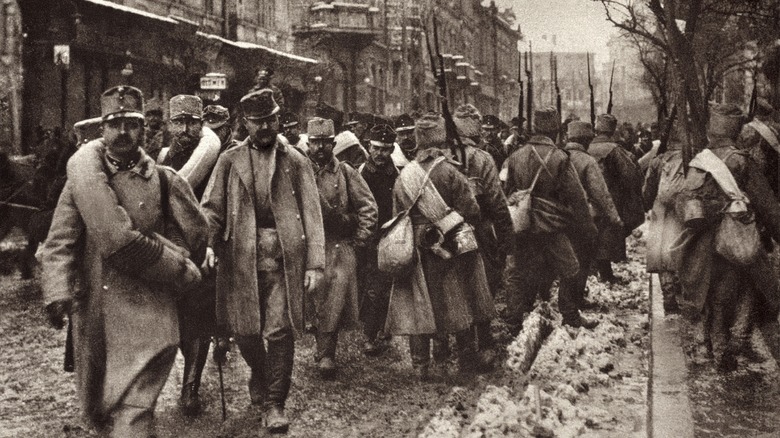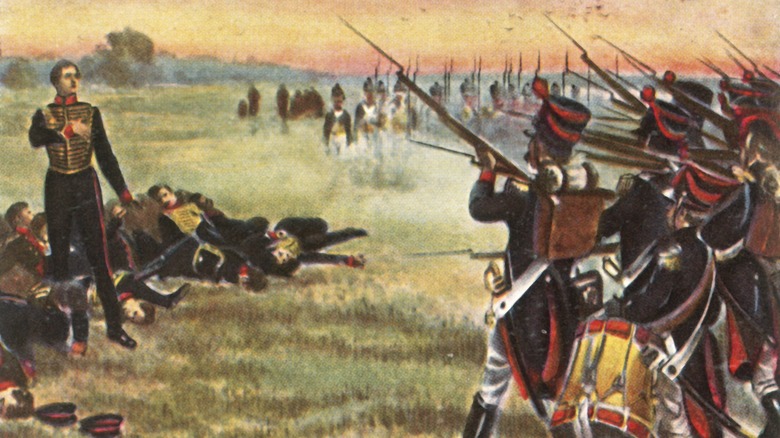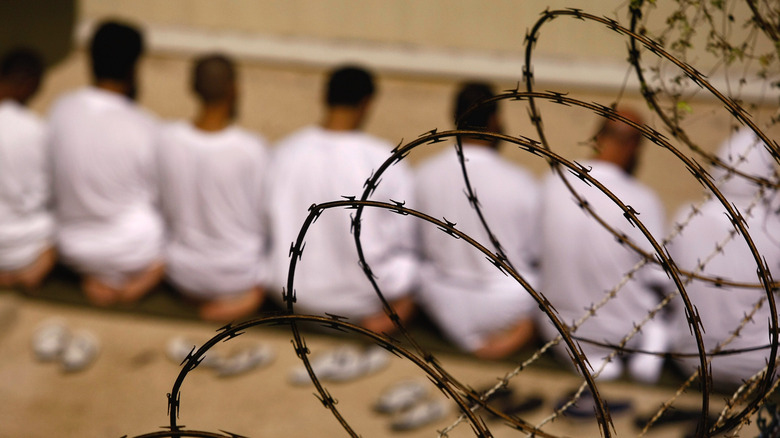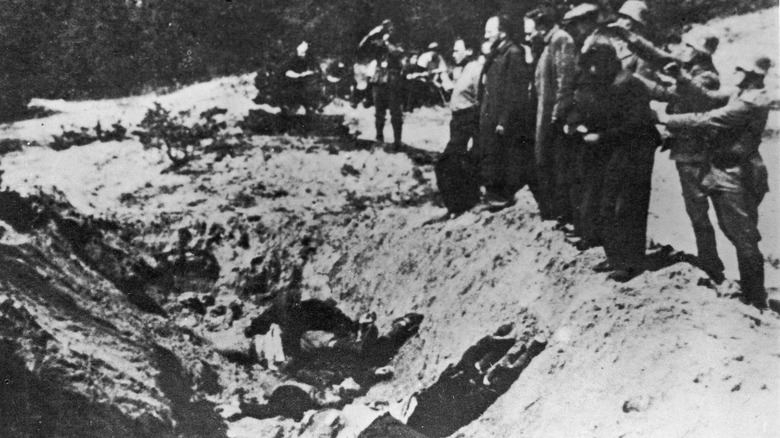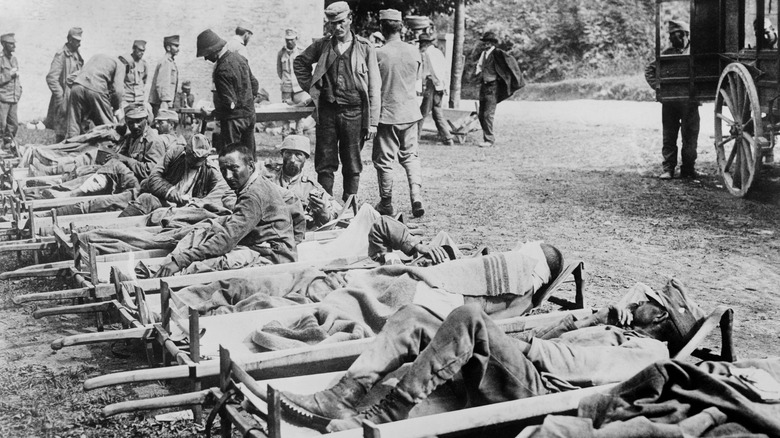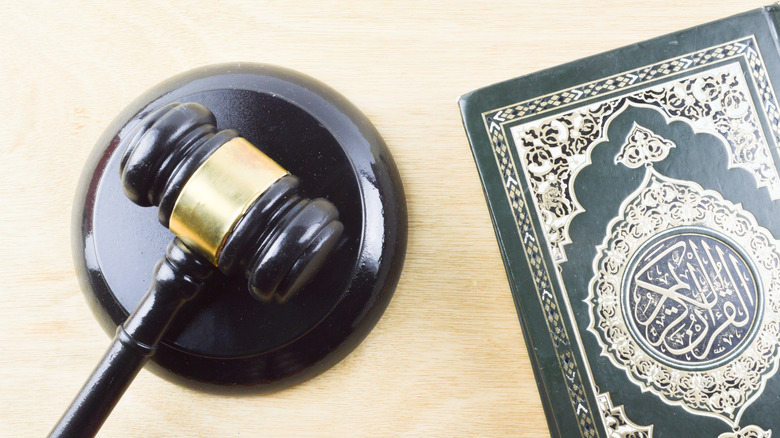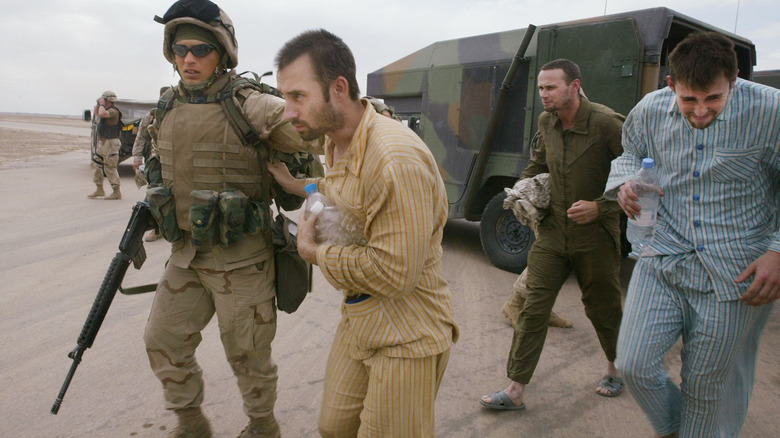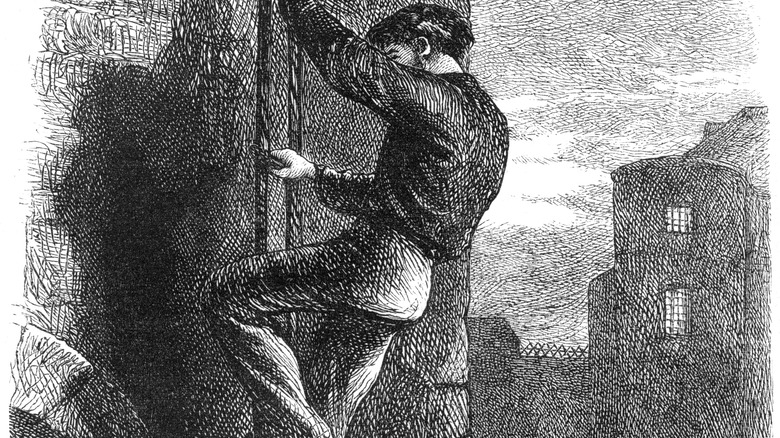What Rights Do POWs Have?
If you had to pick a time to be a prisoner of war, the present is the best time you could choose. While being a POW is never fun, at least POWs today are afforded rights as agreed to by most nations. And that's a relatively recent development.
In Ancient Greece, prisoners of war could be forced into slavery, via The Week. Both Christian and Muslim POWs captured during the Crusades were routinely slaughtered, according to Eyewitness to History. During WWII, both the Imperial Japanese forces and the Nazi German military worked to death or killed tens of thousands of captured enemy soldiers, via Forces War Records and Auschwitz. Even well into the 20th century, POWs were routinely tortured, as was seen in many cases during the Vietnam War, attested to, most famously, in the morse code message blinked out by Jeremiah Denton, via The New York Times.
But on the whole, over the past few generations, things have gotten markedly better for those captured on the battlefield. The Geneva Conventions, first conceived in the early 1900s, were codified into laws approximating their current form in 1949, via ICRC. In short, they lay out protocols aimed at "limiting the barbarity of war ... [and] protect[ing] people who do not take part in the fighting (civilians, medics, aid workers) and those who can no longer fight (wounded, sick and shipwrecked troops, prisoners of war)." Here are some of the most important rights POWs are supposed to be able to count on.
POWs are protected against physical violence and 'insults and public curiosity'
War is, by its very nature, violent. A soldier's goal when engaged in combat is, after all, to kill enemy soldiers. But once a soldier is captured and disarmed, they are supposed to be safe from further injury at the hands of the captors. Under the rules of the Geneva Conventions, via Wales Online, POWs are supposed to be safe from physical harm and also from the intimidation caused by threats of violence.
And in fact, prisoners of war are also supposed to have their dignity and mental wellbeing protected, as well. It is illegal, for example, to parade POWs before the public in a humiliating way or to use insults against them that could be demoralizing or degrading. Which is only fair, because their only offense was being on the other side of the conflict; their human rights should not be made forfeit based on service of their nation.
All that notwithstanding, it's all too common that we do indeed see POWs paraded about or otherwise degraded before people and often before cameras. Even on both sides of the conflict created by Russia's illegal invasion of Ukraine, ongoing at the time of this writing, we see far too many photos and videos of soldiers who have been captured, leading some to wonder whether or not the Geneva Conventions are being upheld, via Daily Mail. But all that said, it's understandably hard to begrudge those whose homeland has been invaded who show off a disgraced enemy now and then.
A POW cannot be executed simply for having fought in a war
If prisoners of war are supposed to be protected against violence — and, in fact, even the threat of violence — and degradation, then it should be little surprise to know that under international law, it is illegal to execute a POW. But it happens. And it used to happen on a massive scale. During World War II in particular, many captured Soviet troops were put to death by the military controlled by Germany's Nazis, via Russia Beyond. In turn, hundreds of thousands of Axis POWs died while captives of the Soviets, via History Net, oftentimes perishing as a result of appalling conditions.
Regardless of what has happened in the past on a large scale and will, of course, happen again on some scale — the smaller the scale the better — prisoners of war cannot be executed by their captors, via the Human Rights Library of the University of Minnesota. In fact, killing an unarmed POW who poses no immediate threat to his or her captors is a war crime which could, in turn, see the killers subject to a death penalty later on. That happened most famously as a result of the Nuremberg Trials following the close of World War II, via History.
POWs do not have to share detailed information
A captured enemy soldier is not obliged to tell his or her captors much at all. Under international law, prisoners of war are supposed to divulge their names, their rank, their date of birth, and their serial number (aka "service number" sometimes). This information, according to the National World War II Museum, is required to be given as per Article 5 of the Geneva Convention rules adopted on July 27, 1929. Beyond those basic identifying facts, a captured soldier does not have to give any information away, and their captors are prohibited from trying to extract additional information.
And, for the record, the reasons this information is required to be shared by captured soldiers is more for the benefit of the POW, not the captors. With the POW's information logged, the captors can inform their enemy that the person is alive and in captivity, for one thing. And second, enlisted soldiers and officers are usually kept apart from one another when in military captivity, and — fair or not — officers are usually given better treatment than enlisted servicemen. So when the captors know who they have captured, they can afford that given POW the treatment the person's rank and position merit under international law.
Prisoners of war must be given food, water, and shelter
Prisoners of war become the responsibility of their captors, and as such they must have their basic needs met. According famed 20th century American psychologist Abraham Maslow, who in a 1943 paper described the "Hierarchy of Needs," via Very Well Mind, those most basic needs are for sustenance and safety, also known as food, water, and shelter. And indeed these basics are specifically required to be provided to POWs. According to Article 20 of the Geneva Conventions (via the United Nations): "The Detaining Power shall supply prisoners of war who are being evacuated with sufficient food and potable water, and with the necessary clothing and medical attention."
And in fact, that's not the only time sustenance is covered in the protocols. Article 26 goes even further in its scope of food and water provisions, reading in part: "The basic daily food rations shall be sufficient in quantity, quality and variety to keep prisoners of war in good health and to prevent loss of weight or the development of nutritional deficiencies." And beyond that, the Geneva Conventions also recognize that those nutritional needs aren't the same for everyone; those who do more work are to be given "additional rations as are necessary."
As for POW hygiene, Article 29 says that POWs are ensured more than simply "baths and showers," but also the soap for said showers and laundry. And to further make sure that POWs aren't being mistreated, the Geneva Conventions specify that adequate "installations, facilities and time be granted ... for that purpose."
POWs are allowed to send and receive letters
Prisoners of war may be hundreds — or even thousands — of miles from home, and they may have very little hope of seeing home again for months or even years, depending on how long the conflict rages and how long it takes for the dust to settle when the guns have quieted again (more than 10,000 German soldiers captured during World War II were repatriated from the Soviet Union in 1953, for example, a good eight years after the war ended, via Tufts University). But they have the right to be in touch with home. According to the International Committee of the Red Cross, POWs are guaranteed the right to send and receive letters during their captivity.
In fact, according to Article 71 of the Geneva Convention of 1949, there is even a specific allotment laying out how much mail a prisoner of war is entitled to receive. The provision reads, in part: "If the Detaining Power deems it necessary to limit the number of letters and cards sent by each prisoner of war, the said number shall not be less than two letters and four cards monthly."
Likewise, POWs are allowed to send out a limited number of letter or even to dispatch "telegrams" (which now may take the form of an email) while in captivity. Censorship of incoming and outgoing missives is permitted in most cases — this is still war, after all.
Prisoners of war cannot be tortured
It is completely and expressly illegal under international law for prisoners of war to be subjected to torture. This is true whether said torture is physical or mental, and whether its intention is to extract information or inflict retribution. And this is made clear early on in the "Geneva Convention relative to the Treatment of Prisoners of War" (via the United Nations), with Article 3 reading in part: "To this end the following acts are and shall remain prohibited at any time and in any place whatsoever with respect to the above-mentioned persons: Violence to life and person, in particular murder of all kinds, mutilation, cruel treatment and torture."
And Article 17 reiterates this, reading in part: "No physical or mental torture, nor any other form of coercion, may be inflicted on prisoners of war."
You just can't torture POWs. And if you think it's crazy that we even need to have an international law saying that, think on how often it has happened anyway since the adoption of the Geneva Convention agreements. American POWs were extensively tortured in Vietnam, for example, with the most famous cases including that of the late Senator John McCain, who was left with lifelong disabilities caused by abuse he suffered while a prisoner of war for more than five years, via U.S. News. And again, witness the abuses Americans inflicted on prisoners taken off battlefields of the so-called War on Terror, abuses including sleep deprivation, humiliation, waterboarding, and other euphemistically titled "enhanced interrogation techniques" that were absolutely torture, per the Los Angeles Times and PHR.
POWs have the right to practice their religion
According to the International Committee of the Red Cross, prisoners of war are guaranteed quite a latitude of rights when it comes to the free exercise of religion. Article 34 of the third Geneva Convention reads in part: "(1) Prisoners of war shall enjoy complete latitude in the exercise of their religious duties, including attendance at the service of their faith, on condition that they comply with the disciplinary routine prescribed by the military authorities. (2) Adequate premises shall be provided where religious services may be held."
Allowing POWs to worship as they wish is a good move for two reasons. First, for many people, religion brings comfort and solace, which can be extraordinarily hard to come by when one is a prisoner of their enemy after having been plucked off a battlefield. And second, the proscription of religious practices is one of the best ways to foment anger and unrest in any population, a group of POWs very much therein included. In other words, if you want to reduce the likelihood of a POW uprising, let the prisoners worship and pray as they wish; if you want to usher in a revolt, go ahead and bar them from religious practice.
POWs who attempt to escape can be punished only with disciplinary confinement
There is a generations-old belief about wartime many hold that, romantic as it may sound, is a complete myth: that myth is the so-called "duty to escape," which is taken to mean that anyone held as a prisoner of war has the responsibility to his or her home nation to act upon any reasonable opportunities to escape from their captors, according to History Extra. While indeed some POWs across different times and places have felt a personal responsibility to escape from their detention, no sane military or government has ever officially imposed this duty on their troops.
If any POW does escape, what he or she can count on, in theory, is that their captors are bound not to act with reprisals beyond temporary additional confinement if the escapee is captured again. So when, per History, dozens of re-captured prisoners were executed after the massive escape from POW camp Stalag Luft III during World War II, the event immortalized in the Hollywood movie "The Great Escape," that was highly illegal.
According to Human Rights News, the rules are quite direct when it comes to re-captured POWs: "If a POW tries to escape and is recaptured, the POW is only liable to disciplinary confinement." Note that there is one caveat: "However the POW may be punished for any violence used in the escape attempt." So don't break any actual laws or hurt anyone as you break out, in other words.
Wounded or injured POWs are entitled to the same level of care as members of the capturing military
There are multiple clauses in the Geneva Convention protocols that speak to the need for prisoners of war to be given all necessary medical care, and for that care to be commensurate with the type and quality of treatment the troops or citizens of the captor nation would receive. According to the Office of the High Commissioner of the United Nations Human Rights, Article 22 reads in part: "Prisoners of war may be interned only in premises located on land and affording every guarantee of hygiene and healthfulness ... Prisoners of war interned in unhealthy areas, or where the climate is injurious for them, shall be removed as soon as possible to a more favorable climate."
And Article 30 adds onto that even further, making explicit that "every camp shall have an adequate infirmary" for prisoners of war, and, in the case of anything that's congagious, special "isolation wards" could also be set up (the article also specifies that such wards can be used for "mental disease" as well). But in cases of "serious disease, or ... special treatment," such as surgery, then outside medical units have to be used instead.
Essentially, once in captivity, a POW is no longer to be treated like an enemy; they are to be helped back to health — quite the opposite of being shot at or bombed or bayonetted.
Prisoners of war are subject to the same laws and rights of the nation in which they are held
If you become a prisoner of war, you can count on the many rights afforded to you by the Geneva Conventions, assuming you are being held by captors who are a party to the protocols laid out therein and are abiding by the rules. But beyond those rights laid out in the Geneva Conventions, a POW is compelled to follow the same rules as the military of their captors and, beyond that, they are subject to the local laws of the land in which he or she is being held.
According to Human Rights Watch: "POWs are subject to the laws and orders of the enemy army, they can be tried and punished for the same infractions and with the sanctions for which members of the enemy army can be tried and punished. In case they commit a non-military crime they are subject to the laws and courts of the Detaining Power." This is a provision that can cut both ways. On the one hand, it can mean added protection for the POW thanks to the just rule of law. But on the other hand, it can mean even more potential for running afoul of laws that may be foreign to the POW. A POW from a non-Muslim country may inadvertently break the law in a land ruled by Sharia courts, for example. Or someone accustomed to the "innocent until proven guilty" mores, the type of freedom to which many Westerners are conditioned, may be shocked by the approach to freedom found elsewhere (or the different interpretations of freedom itself, via Libertarianism).
POWs must be released and returned home when hostilities cease
When a war is over, so too is the time of captivity for prisoners of that war on both sides. Which only makes sense, because why would any side want to go on housing and feeding someone they can just release back to their own nation? According to Geneva Convention rules (via Wales Online), as soon as the hostilities between warring parties cease and an agreement is in place, be it a detente, a lasting ceasefire, or, of course, an actual instrument of surrender from one side, the POWs are supposed to be released.
The caveat here is that if a captured soldier is being tried for or has been convicted of war crimes, or if he or she committed a further crime (military or civil in nature) while a POW, then their detention can continue and may transition into the military or civil court system of the country or governing body that held them (via Britannica). We have seen examples of this happening primarily after WWII, per History, when many members of the German military were tried for war crimes during the Nuremburg Trials and sentenced to long jail terms or, in a number of cases, were sentenced to execution.
Successfully escaped POWs are not to be punished if captured again later
To be clear, when you hear a "successful escape," that means, in this case, a complete and total escape, as in a prisoner of war who breaks free from detention, makes it all the way back to their own lines or to a friendly — or neutral — power and then is repatriated. This person shall no longer be considered a prisoner of war, escaped or otherwise. Thus any POW who breaks for it and reaches safe territory is no longer a prisoner of war and, as such, cannot be punished for the earlier escape if recaptured again, per How Stuff Works.
Sure, if they return to the war effort, they can be captured again and they can become a POW for a second time — or even a third or a fourth — but they cannot be subjected to any punishment more severe than any other prisoner of war being caught and detained for the very first time. Of course, as noted, these protections do not hold for a less-than-fully-successful POW escapee — one re-captured before making it out of hostile territory. For those unlucky few, there may indeed be some additional unpleasantness, but recall that the only legal punishment for escaped POWs is punitive detention, such as a period of solitary confinement (via Human Rights News).
